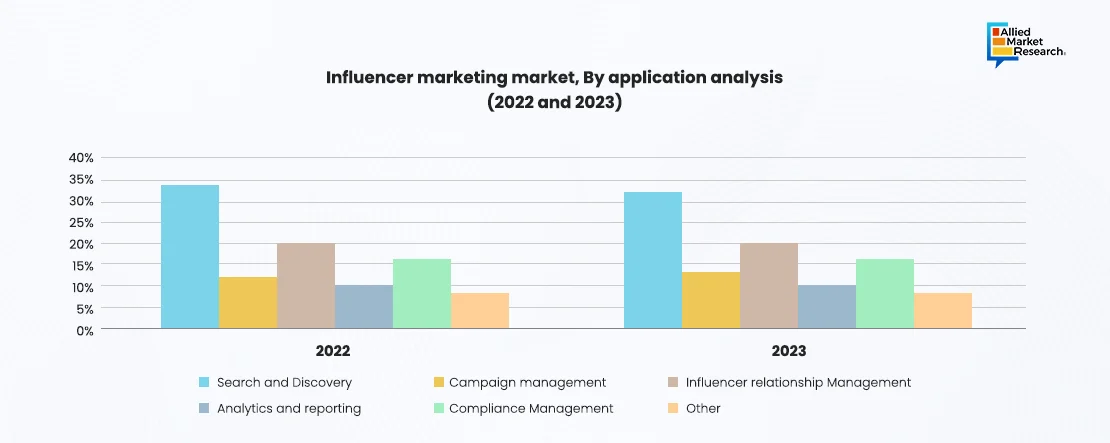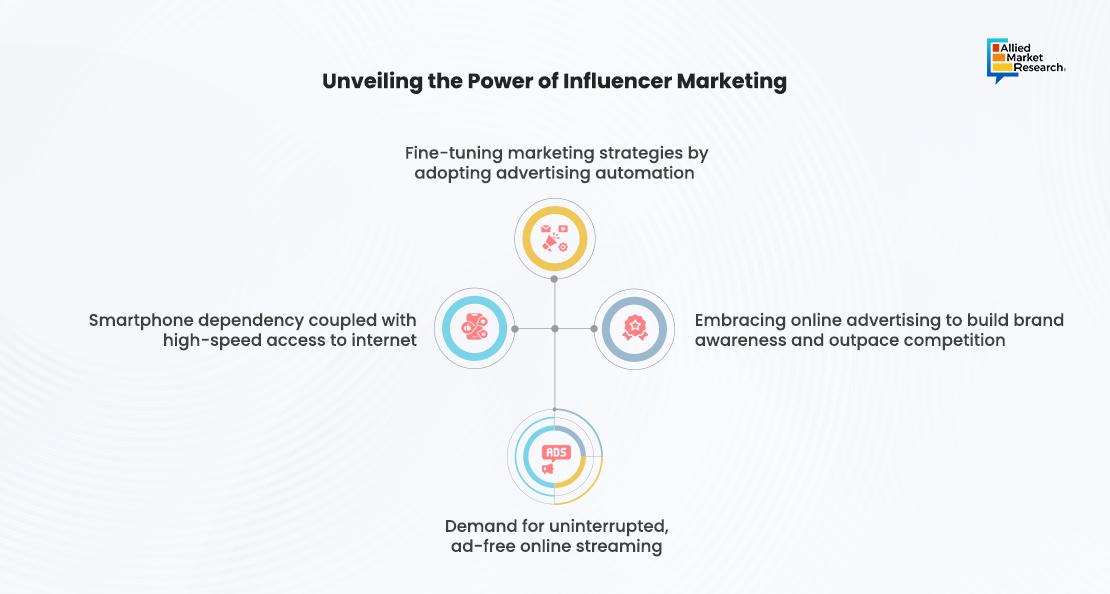Table Of Contents
- Digital Transformation Reshaping the Industry
- Influencer Marketing Enabling to Manage Entire Campaign Cycle
- Adtech to gain ground
- Exploring the Factors that Shape the Market
- AI-driven Marketing: Boosting Campaign Management
- Influencer Marketing: A Potential Tool for the BFSI Industry
- The Future of Influencer Marketing Industry
- Challenges ahead
- Future Trends to Revolutionize Influencer Marketing
- Influencer Marketing: A Game-changing Solution

Onkar Sumant

Pooja Parvatkar
Influencer Marketing: A Surefire Approach for Success

The key to influencer marketing is finding the right individuals whose values and audience align with the brand. As influential celebrities pack a punch, the trend is moving toward micro-influencers whose small but engaged followings tend to translate into higher levels of trust. Authenticity is key to the influencer industry; encouraging influencers to create real content that aligns with a brand’s message creates a deeper connection with their audience.
Digital Transformation Reshaping the Industry
The influencer marketing industry is constantly evolving, with the advent of AI-driven virtual influencers. Although the industry is growing exponentially, influencer fraud has become a major concern with fake accounts popping up and brands falling prey to these so-called influencers. According to Statista a German online platform engaged in data gathering and visualization around 49% of influencers are involved in follower fraud. However, increase in penetration of AI and machine learning technologies has mitigated the risk of influencer fraud. As per the records of computer scientists from the University of Jakarta, machine learning algorithms achieved up to 96% accuracy in reducing fraud for e-commerce businesses. Thus, AI-powered marketing is gaining significant value by brands as a crucial tool for reaching target audiences, enhancing brand recognition, rising engagement, boosting revenue, and preventing fraud. This is further encouraging leading players in this industry to actively invest in these technologies to meet the ever-changing demands of influencer marketers.
Influencer Marketing Enabling to Manage Entire Campaign Cycle
Influencer marketing platforms facilitates in managing the entire campaign cycle, which involves search & discovery, campaign management, influencer relationship management, analytics & reporting, compliance management, and others. This versatile strategy spans across industries, harnessing the influence and reach of trusted individuals to connect brands with their target audiences in engaging ways.

Adtech to gain ground
Adtech is a broad term that categorizes the software and tools that agencies, brands, publishers, and platforms use to target, deliver, and measure their digital advertising efforts. This software is designed to help companies and agencies create, run, measure, and manage digital advertising campaigns. It further enables publishers to sell their available ad space to the largest number of advertisers possible. Moreover, specialized adtech platforms deal with audience profiling, activation, verification, viewability, and measurement. With that amount of volume, adtech helps buyers optimize their budgets and sellers maximize their revenue stream. In addition, it provides comprehensive behavioral data that can be used to target potential audiences better and measure campaign success. Due to data-driven insights from billions of consumers' device interactions, adtech has become more popular as companies discover these solutions are very cost-effective for businesses.
Publishers are looking for the best adtech investment trends that can monetize their ad space at the most competitive price and with the most relevant content, while advertisers are looking for the best solution that fits their audience. For instance, according to Baazarvoice, a technology company that helps brands capture, analyze, and act upon social data, 49% of shoppers across the globe are now shopping online more than they were pre-COVID.
Exploring the Factors that Shape the Market
Smartphone dependency has been witnessed to increase exponentially overtime, which is eventually intensifying the demand for high-speed internet. This acts as a key force shaping the market landscape. However, to enjoy uninterrupted online streaming of news and favorite shows, netzines are purchasing ad-blockers to avoid online advertising, which serves as a key challenge for the development of the influencer marketing industry. Contrarily, the emergence of advertising automation and growing interest of business owners for online advertising to increase brand awareness are expected to open new avenues for the market growth in the coming years.

AI-driven Marketing: Boosting Campaign Management
Brands streamline their marketing activities, improve campaign effectiveness, and assess the ROI of their influencer engagements by using campaign management apps. The integration of AI and ML technologies enhances marketing campaign performance by analyzing massive volume of data to identify and gain valuable insights about the preferences and behavior of the target audience. Thus, the most appropriate influencers for a brand's target audience are found via extensive data analysis performed by AI-powered campaign management solutions, resulting in more accurate and successful influencer matching.
By examining previous data and providing data-driven recommendations for content strategy, campaign budgets, and influencer alliances, ML algorithms help in improving the efficiency of marketing campaigns. Campaign management solutions, which offer thorough influencer databases with in-depth audience insights, engagement metrics, and performance statistics, can assist marketers in navigating this large influencer environment. Brands use this to find the influencers that are best suited for their campaigns and create strong collaborations.
Influencer Marketing: A Potential Tool for the BFSI Industry
The BFSI industry vertical includes enterprises such as retail, private, corporate and investment banking service providers, non-banking financial companies (NBFCs), mutual funds, pension funds, insurance service providers, and other smaller financial entities. Influencer marketing in the BFSI industry is a growing trend that involves partnerships with social media influencers experts to promote financial products and services. These include initiatives to inform audience about the complexity of financial products and services. Influencers further assist in elaborating on numerous elements of the sector, including risk management, investment, retirement planning, and personal finance.

Furthermore, brokers, BNPL (buy now, pay later) brands, banks, NBFCs, wealth management companies and mutual fund apps are increasingly deploying influencers for marketing. The Brands such as Motilal Oswal, Cleartax, Uni Cards, Navi Group, PolicyBazaar, CTA FX, Smallcase, Groww, and CoinSwitch Kuber use influencers to promote their offerings and drive traffic to their platforms. For instance, in February 2022, Rachana Ranade, who runs a YouTube channel that has 3.39 million subscribers, starts her videos with a story. In her latest video on “things you must know before entering 30s,” she created a short storyline about how youngsters plan their weekends depending on the cash they have in hand. This is a 15-second segment in her 16-minute-long video that grabs the attention of her audience and makes them curious about solutions.
The Future of Influencer Marketing Industry
In the dynamic world, technological advancements are likely to reshape the way influencers and brands interact with their audiences. The adoption of emerging technologies such as augmented reality (AR) and virtual reality (VR) presents new avenues for influencers to create more engaging and immersive content, providing unique and memorable experiences for their followers. This shift toward interactive and innovative content may redefine the nature of influencer collaborations and the types of campaigns that resonate with audiences. Furthermore, the future of influencer marketing is expected to see a continued emphasis on authenticity and long-term partnerships. Brands are recognizing the importance of genuine connections with influencers who share common values and beliefs. Authenticity builds trust, and as consumers become more discerning, brands will likely prioritize sustained relationships with influencers who authentically represent their products or services. This shift may lead to a departure from short-term, transactional collaborations in favor of more enduring and meaningful brand–influencer partnerships.
As social media platforms continue to integrate e-commerce features, influencers will likely become more instrumental in driving direct sales. Platforms such as Instagram and TikTok already offer shopping functionalities, enabling influencers to seamlessly promote and sell products to their followers. This integration may transform influencer marketing into a more robust sales channel, with influencers serving as key contributors to a brand's overall revenue. For instance, according to a report by Influencer Marketing Hub, the influencer marketing industry was expected to grow to approximately $21.1 billion in 2023, and to reach $69.92 billion by 2029, registering a CAGR of 32.50%. The report further unveils that over 83% of marketers affirm the effectiveness of influencer marketing as a strategy and 67% of brands increased their budgets in 2023.

Challenges ahead
With the changing dynamics, the industry is likely to face several challenges as the industry matures. One of the leading challenges is the saturation of the influencer landscape, making it increasingly difficult for brands to identify genuine and impactful influencers amid a crowded field. As the market becomes more saturated, maintaining authenticity becomes a crucial hurdle for influencers. In addition, issues related to influencer fraud, such as fake followers and engagement, pose a persistent threat to the credibility of influencer marketing. Striking a balance between disclosure and seamless integration of sponsored content is another challenge, as regulators may enforce strict guidelines, and audiences demand more transparency. Moreover, as the industry grows, influencers may face burnout, impacting the quality and consistency of their content. The evolution of algorithms on social media platforms further poses a challenge, affecting the visibility of influencer content and requiring constant adaptation to new algorithms.
Future Trends to Revolutionize Influencer Marketing
The market is poised to witness transformative trends:
- Nano- and Micro-influencers: As the industry matures, there is a growing recognition of the effectiveness of nano- (1,000-10,000 followers) and micro- (10,000-100,000 followers) influencers. These influencers often have highly engaged, niche audiences, and brands are likely to tap into their authenticity and more personal connections with followers.
- Virtual Influencers and AI Avatars: The emergence of virtual influencers, computer-generated characters that interact with followers is a trend that might reshape the market. These AI avatars offer brands complete control over their image, messaging, and even allow for 24/7 availability, presenting new and intriguing opportunities for marketing campaigns.
- Ephemeral Content and Stories: Rise of ephemeral content on platforms such as Instagram and Snapchat has changed the way audiences consume information. Influencers are likely to focus more on creating temporary, engaging content that fosters a sense of urgency and exclusivity, aligning with the fleeting nature of these platforms.
- Interactive Content and Gamification: Influencers are expected to incorporate more interactive elements and gamification into their content, enhancing user engagement. This could involve quizzes, polls, challenges, or even augmented reality filters that encourage followers to participate and share their experiences.
- Sustainability and Social Impact Influencers: With an increasing awareness of social and environmental issues, influencers advocating for sustainability and social impact are gaining prominence. Brands are likely to collaborate with influencers who align with values related to ethical practices, environmental responsibility, and social causes.
- Video and Live Streaming Dominance: Video content, especially short-form videos and live streaming, continues to dominate social media. Influencers are anticipated to create more video-centric content, utilizing platforms like TikTok, YouTube, and Instagram Reels to engage audiences and provide dynamic and visually appealing brand collaborations.
- Shoppable Content: The integration of e-commerce with social media platforms is set to transform the industry. Shoppable posts and features allow influencers to directly link products to their content, streamlining the path to purchase and making influencer marketing a more direct driver of sales.
- AI-driven Personalization: AI will play a crucial role in influencer marketing by enabling more personalized and targeted campaigns. AI algorithms can analyze massive volume of data to identify the most relevant influencers for specific audiences, improving the efficiency and effectiveness of collaborations.
- Blockchain for Transparency: Blockchain technology may be employed to address transparency issues in influencer marketing. Smart contracts on the blockchain can automate payment processes, verify engagement metrics, and ensure that influencers meet their contractual obligations, fostering trust between brands, influencers, and their audiences.
Influencer Marketing: A Game-changing Solution
The market landscape is poised for dynamic growth, driven by emerging trends and technological advancements. The industry can drive a shift toward authenticity, focusing on real, long-term partnerships and moving away from traditional, interactive collaboration as nano and micro-influencers come into prominence and build niche audiences and more personal relationships emphasize back to influencer marketing dynamics. The integration of virtual influencers, AI avatars, and other content formats, such as interactive and shoppable content, is set to help create a more engaging and engaging audience experience. Furthermore, influencer advocacy and social impact are expected to play an important role as consumers value brands with ethical practices and reasonable products. However, challenges such as influencer fraud and legal considerations exist, requiring flexibility and transparency. In taking on these challenges, influencer marketing has the potential to be a powerful and influential medium, driving brand awareness, engagement, and even direct sales in an ever-evolving digital landscape.

